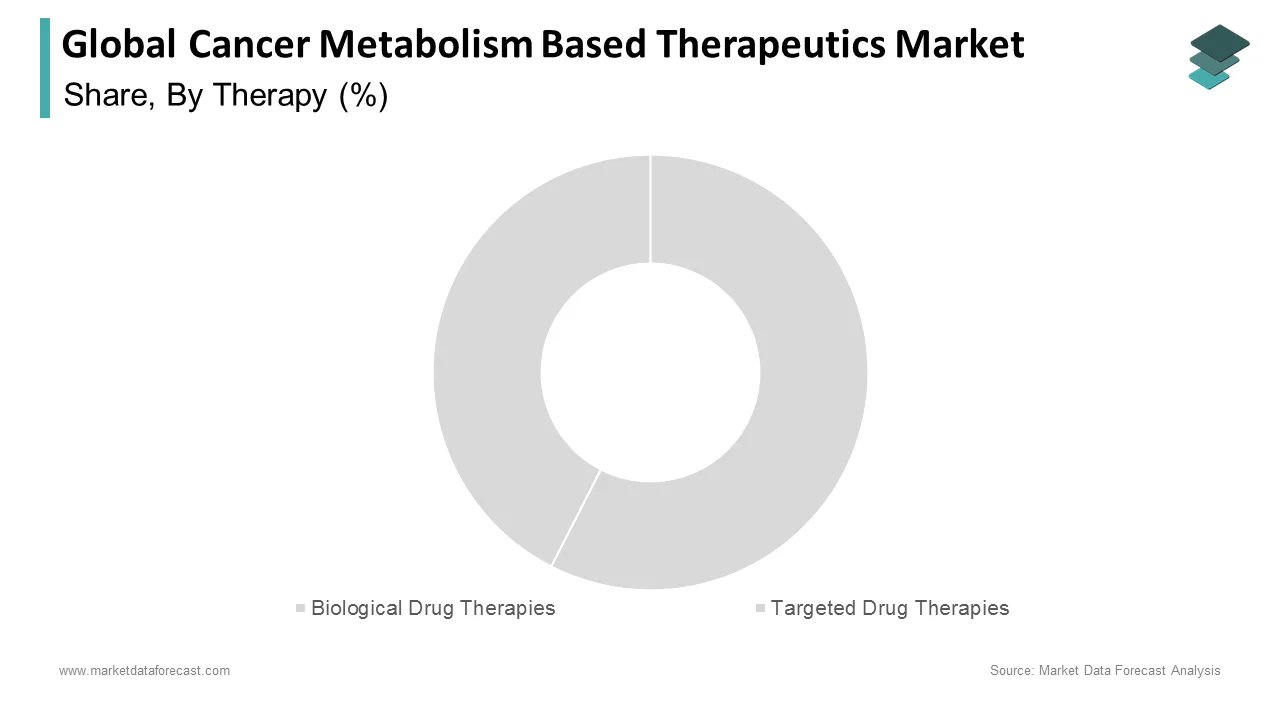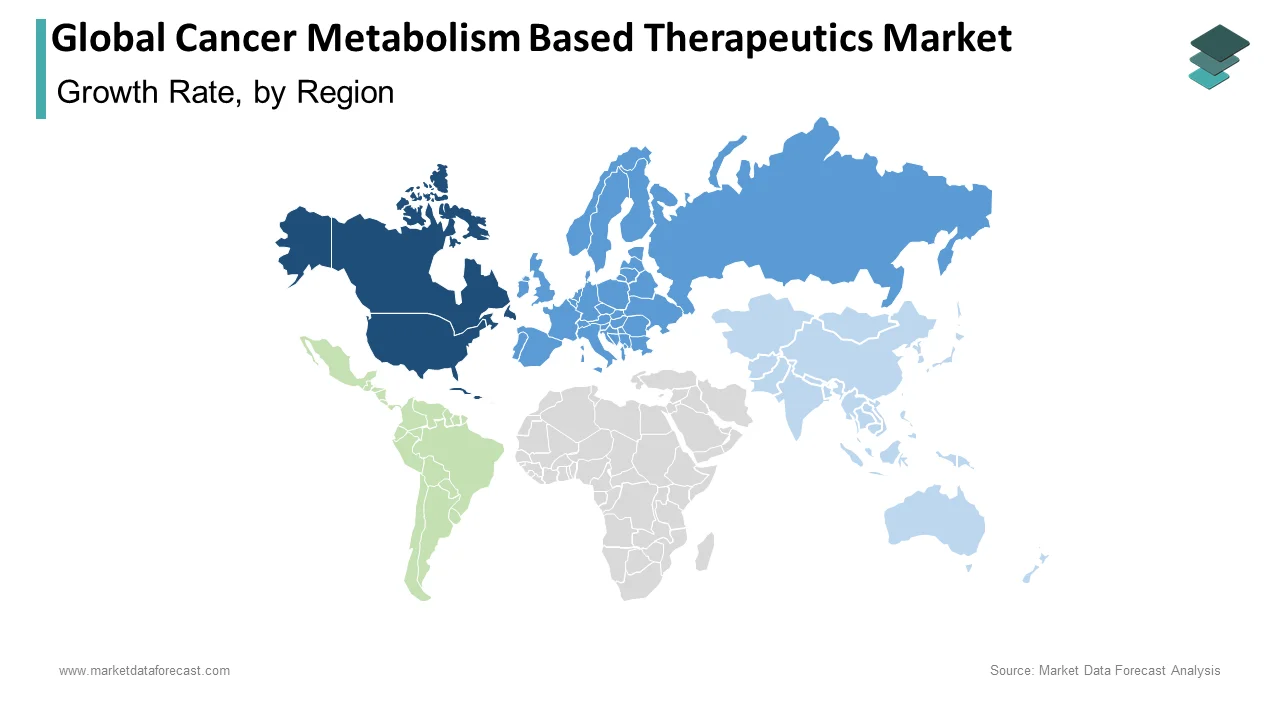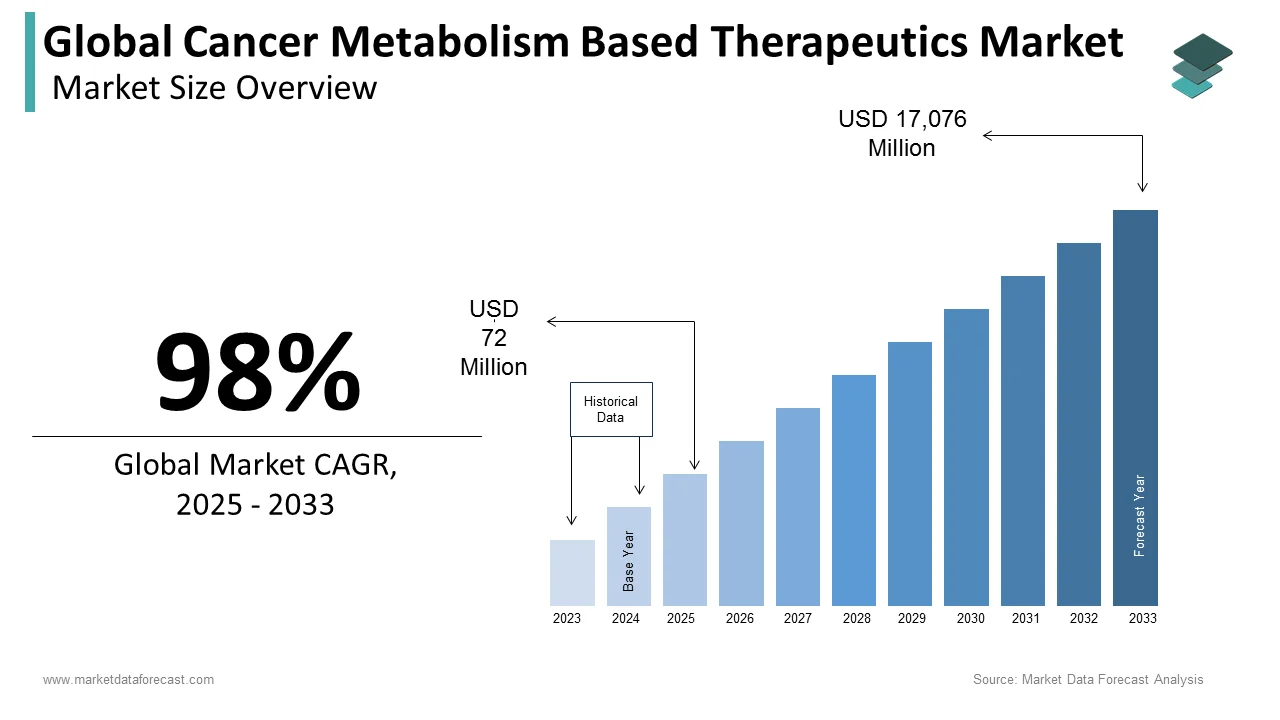Global Cancer Metabolism Based Therapeutics Market Size, Share, Trends & Growth Forecast Report By Therapy, Drug Type, Indication and Region (North America, Europe, Asia-Pacific, Latin America, Middle East and Africa), Industry Analysis From 2025 To 2033.
Global Cancer Metabolism-Based Therapeutics Market Size
The global cancer metabolism-based therapeutics market was worth US$ 36.51 million in 2024 and is anticipated to reach a valuation of US$ 17,076 million by 2033 from US$ 72 million in 2025, and it is predicted to register a CAGR of 98% during the forecast period 2025-2033.
MARKET DRIVERS
Cancer metabolism is based on the principle that cancer cells have different metabolic activities to support their elevated levels than normal cells. The rise in cancer cases around the world will drive the growth of this market. Factors like an increase in smoking increased exposure to radiation, and an unhealthy lifestyle also leads to cancer and thus contribute to the growth of the market. The effectiveness of this method in treating cancer is a significant factor that will drive growth. As the research and development of this therapy progress, we will see better results for cancer treatment. It will invite more research institutes and companies to adopt this method and improvise it to a new level, thus contributing to market growth.
MARKET RESTRAINTS
The main challenge for this market is to gain trust in the medical field about its effectiveness in cancer treatment. There are many treatments in the development stage, and this healthy competition is overall necessary for a cure but bad for cancer metabolism based therapeutics market. Research and development require a lot of funding, which remains a significant challenge for this market.
REPORT COVERAGE
|
REPORT METRIC |
DETAILS |
|
Market Size Available |
2024 to 2033 |
|
Base Year |
2024 |
|
Forecast Period |
2025 to 2033 |
|
CAGR |
98% |
|
Segments Covered |
By Therapy, Drug Type, Indication, and Region. |
|
Various Analyses Covered |
Global, Regional, and country-level analysis; Segment-Level Analysis, DROC; PESTLE Analysis; Porter’s Five Forces Analysis, Competitive Landscape; Analyst Overview of Investment Opportunities |
|
Regions Covered |
North America, Europe, APAC, Latin America, Middle East & Africa |
|
Market Leaders Profiled |
AstraZeneca, Novartis, Celgene, Rafael Pharmaceuticals, Cornerstone Pharmaceuticals, Polaris Group, Agios Pharmaceuticals, Taiho Pharmaceuticals, 3-V biosciences, Calithera Biosciences, and BERG Health, and Others. |
SEGMENTAL ANALYSIS
By Therapy Insights

Biological drug therapy is expected to grow at a reasonable rate in the future, owing to increased cancer cases and advances in research and development. Biological drug therapy is a treatment designed to restore the body's immune system's ability to fight a disease or infection. It uses portions of the body's immune system to fight the disease. The therapy involves the use of substances called biological response modifiers (BRMs). Targeted drug therapy is expected to grow faster due to increased positive cancer cases and advancement in research and development. It is a treatment that uses drugs to target specific genes and proteins involved in the growth and survival of cancer cells. Target drug therapy affects the tissue affected by cancer cells or the target cells related to cell growth like blood vessels. These therapies are used to treat diseases like breast cancer, lung cancer, Chronic Leukaemia, Lymphoma, etc.
By Drug Type Insights
Based on drug type, the CPI-613 was introduced recently in 2018, which is considered the best drug to treat pancreatic cancer. Enasidenib is also got its important in treating pancreatic cancer. According to a report from the American Cancer Society in 2018, 53 thousand of people were diagnosed with pancreatic cancer, and around 43 thousand of them are experiencing a threat to their lives. Rafael pharmaceuticals introduced CPI-613 in 2017, which is an anti-cancer compound. It is expected to grow at a reasonable rate in the future. The CPI-613 is designated an orphan drug to treat pancreatic cancer, acute myeloid leukemia, and Myelodysplastic syndromes. The further use of the drug in Tcell lymphoma treatment will drive the market's positive growth. Enadiseb is also used widely to treat cancer and grow at a reasonable rate in the future. It is used in oral form, and the rise in cancer cases will majorly contribute to its growth in the market. The advancement in research for finding the potential of this drug to treat various cancers will increase its popularity and contribute to its development.
By Indication Insights
Around twenty-one thousand cases of Acute Myeloid Leukemia attacks were reported by the American Cancer Society in 2018, out of which 50% are experiencing the terminal stage. Many non-profit organizations came into the picture to help people. They increased awareness about pancreatic cancer symptoms and the treatment process, allowing the rise in market size. Most cases now are of Acute Myeloid leukemia, and it leads to the market segment. An increase in cases will further drive market growth. Melanoma is a type of skin cancer that develops from pigment-producing cells known as melanocytes. It is expected to rise in the future due to the increasing population and prevalence of unhealthy lifestyles.
REGIONAL ANALYSIS

Geographically, as the number of people with pancreatic cancer is high in North America, the North America cancer metabolism based therapeutics market dominates the Global Market.
North America is the market leader among all other regions and is expected to grow at a reasonable rate in the future. The rise in positive cancer cases due to the increase in population and unhealthy lifestyles is the major contributing factor to the market. The development of healthcare facilities due to government intervention and increased awareness has led to significant developments in this market.
Europe has the second largest market share among other regions. The rise in positive cancer cases and a significant improvement in healthcare facilities is the primary reason for the growth of the market. The increase in awareness about the symptoms of cancer has fuelled market growth.
Asia Pacific Region is expected to grow at the fastest rate among other regions. The rise in cancer cases due to the increase in population in countries like China and India is the primary factor responsible for the fastest growth. The improvement in healthcare facilities due to government intervention has allowed patients to access new advanced technology. As there are increasing cancer cases every year in developing countries like India and China, the potential for market expansion is high in these countries.
KEY MARKET PLAYERS
Some of the key market participants leading the global cancer metabolism-based therapeutics market profiled in this report are AstraZeneca, Novartis, Celgene, Rafael Pharmaceuticals, Cornerstone Pharmaceuticals, Polaris Group, Agios Pharmaceuticals, Taiho Pharmaceuticals, 3-V biosciences, Calithera Biosciences, and BERG Health.
MARKET SEGMENTATION
This research report on the global cancer metabolism-based therapeutics market has been segmented and sub-segmented based on the therapy, drug type, indication, and region.
By Therapy
- Biological Drug Therapies
- Targeted Drug Therapies
By Drug Type
- Enasidenib
- CPI-613
- Other Drugs
By Indication
- Melanoma
- Myelodyspalstic Syndrome (MDS)
- Acute Myeloid Leukemia (AML)
- Metastatic Renal Cell Carcinoma
- Others
By Region
- North America
- Europe
- Asia Pacific
- Latin America
- The Middle East and Africa
Frequently Asked Questions
What are the key players operating in the cancer metabolism-based therapeutics market?
Agios Pharmaceuticals, Inc., AstraZeneca plc, Celgene Corporation, Merck & Co., Inc., Novartis AG, Pfizer Inc., Roche Holding AG, Sanofi S.A., Taiho Pharmaceutical Co., Ltd., and Takeda Pharmaceutical Company Limited are some of the notable companies in the market.
What are the factors driving the growth of the cancer metabolism-based therapeutics market?
The growing incidence of cancer, increasing research and development activities in the field of cancer metabolism, and the rising adoption of personalized medicine approaches for cancer treatment are some of the key factors driving the growth of cancer metabolism-based therapeutics market.
Related Reports
Access the study in MULTIPLE FORMATS
Purchase options starting from $ 2500
Didn’t find what you’re looking for?
TALK TO OUR ANALYST TEAM
Need something within your budget?
NO WORRIES! WE GOT YOU COVERED!
Call us on: +1 888 702 9696 (U.S Toll Free)
Write to us: [email protected]

